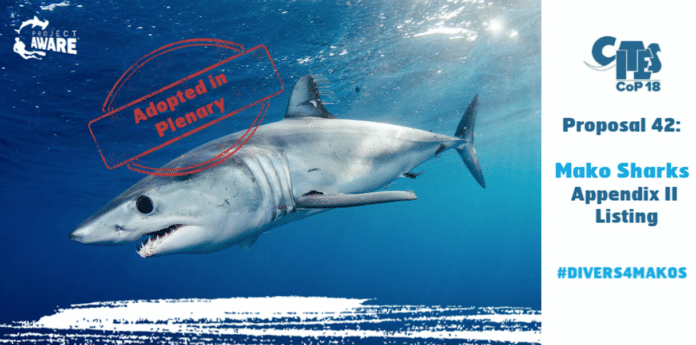Conservation groups are praising this week’s confirmation that all species of Wedgefishes, Giant Guitarfishes, and Mako Sharks will be added to Appendix II of the Convention on International Trade in Endangered Species (CITES).
The listings mandate that countries track exports as well as high seas take, and demonstrate that internationally traded products from these species are legally sourced from sustainable fisheries.
Sonja Fordham, President of Shark Advocates International, said:
“Today’s decisions offer promise of a brighter future for these highly threatened shark and ray species, as international trade has been a major factor in depletion of their slow growing populations. CITES listing can help end unsustainable use of Makos, Wedgefishes, and Giant Guitarfishes by prompting improved trade data and much-needed limits on exploitation, while complementing other conservation commitments. As fishing is the main threat to sharks and rays, it’s essential that countries’ CITES representatives work with their national fisheries agency counterparts to ensure that the new obligations are carried out over the coming months.”
Shortfin Makos, exceptionally valuable and vulnerable oceanic sharks, are at risk from targeted and incidental fishing driven by demand for meat and fins. A lack of limits on take is leading to overfishing and a worldwide decreasing trend. Both the Shortfin Mako and the rarer Longfin Mako Shark are classified as “Endangered” on the IUCN Red List.
The North Atlantic offers the clearest case of Shortfin Mako overfishing and decline. In 2019, scientists associated with the International Commission for the Conservation of Atlantic Tunas (ICCAT) reported that North Atlantic Shortfin Mako catches need to be cut by roughly an order of magnitude (~3000 to ~300 tons per year) to give the population a decent (60%) chance of recovering within five decades. Taking into account incidental mortality, ICCAT scientists are recommending a complete ban on North Atlantic Shortfin Mako retention.
Ali Hood, Director of Conservation for the Shark Trust, said:
“Considering that Spain leads the world in Mako Shark landings, we’re encouraged that the European Union co-sponsored the proposal to list Makos under CITES. We urge the EU to underscore this commitment through proposals to immediately ban North Atlantic Shortfin Mako retention and establish concrete catch limits to ensure Mako landings from all other oceans are sustainable. As virtually all fishing countries are CITES Parties, we’ll be watching for support for such Mako limits at regional fisheries bodies around the world, starting with ICCAT in November.”
Wedgefishes and Giant Guitarfishes, collectively known as Rhino Rays (after their pointy snouts), are considered the world’s most threatened marine fishes. All but one of these 16 shark-like ray species have been classified as “Critically Endangered” on IUCN’s Red List. Their fins are among the most valuable in the global shark fin trade. The coastal fisheries that target or retain Rhino Rays as bycatch are poorly monitored, essentially unregulated, and increasingly intense.
To help drive public support of these efforts, PADI supported petitions and awareness campaigns led by Project AWARE. Through the #Divers4Makos campaign, over 23,000 supporters, many of which are PADI members and divers, signed the petition and demonstrated public support for the protection of makos.
Ian Campbell, Associate Director for Project AWARE, said:
“Rhino Rays are seriously threatened by demand for fins and food, but these extraordinary species have the potential to offer long-term, sustainable benefits as key attractions for ecotourism, particularly in the Indo-Pacific region. We are deeply grateful to the many divers who joined us in voicing support for the CITES listings. We now look forward to working with this network and our other partners toward ensuring prompt and full implementation of the international conservation commitments made today.”

